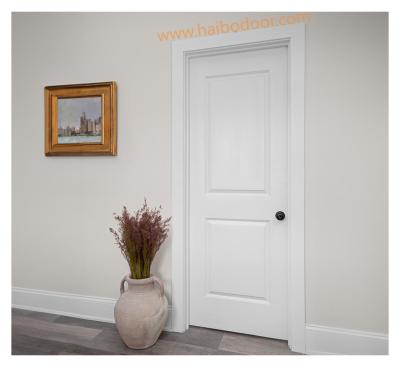-
How Haibo’s Interior Door Factory Supports Energy-Saving Homes: In a home where comfort and energy efficiency are priorities, the type of interior doors you install matters more than you might expect. While walls and windows are obvious insulation elements, interior doors also help regulate temperature and airflow throughout a house.
A forward-thinking Interior Door Factory like Haibo understands this balance, producing doors that not only enhance design aesthetics but also contribute to a smarter, more energy-efficient lifestyle.
Thermal Zoning Inside the Home
One key benefit of using well-designed interior doors is the ability to create thermal zones. Bedrooms, bathrooms, kitchens, and living areas often have different heating and cooling needs. A high-quality interior door helps seal off these areas, maintaining stable temperatures and reducing the strain on your HVAC system.
Whether you're trying to keep cool air contained in a single room or avoid heat loss during winter, interior doors act as passive climate managers, especially when they’re tightly sealed and built with insulation-friendly materials.
What Makes a Door Energy-Efficient?
Not all doors are created equal. Energy-conscious interior doors often feature:
Solid-core or foam-core construction for better thermal resistance
Precision-fitted frames to reduce air leakage
Smooth-sealing hinges and locks that limit gaps and drafts
Doors produced by experienced factories like Haibo are crafted to optimize these features, ensuring every door contributes to a more controlled indoor climate.
Additionally, modern interior doors can incorporate laminated surfaces or composite cores that resist heat flow better than traditional hollow or plywood designs.
Material Matters
The choice of materials plays a critical role. Solid wood doors, while beautiful, can expand and contract with temperature changes, affecting their seal. Composite or engineered wood doors often maintain a more stable form and offer enhanced insulation when manufactured properly.
At Haibo’s Interior Door Factory, materials are selected not just for their looks, but also for their performance in everyday living environments, including their ability to resist temperature swings and humidity.
Comfort Beyond Temperature
A well-insulated interior door also contributes to noise reduction, which enhances the comfort of private or shared spaces. Parents working from home, children studying, or families resting all benefit from quieter, thermally stable rooms—something an energy-smart door can help achieve.
Moreover, these doors often include low-emission finishes, reducing indoor air pollutants and supporting healthier living environments.
Design Meets Responsibility
Today’s homeowners want doors that are both beautiful and intelligent. Haibo’s factory offers a wide range of interior door styles—classic, modern, minimalist—crafted to support sustainable living without sacrificing visual appeal.
With clean lines, durable coatings, and materials sourced for both form and function, each door becomes part of an energy-conscious home. To find the right interior door for your home’s energy goals, explore more at www.haibodoor.com and see how function and design come together at Haibo.
